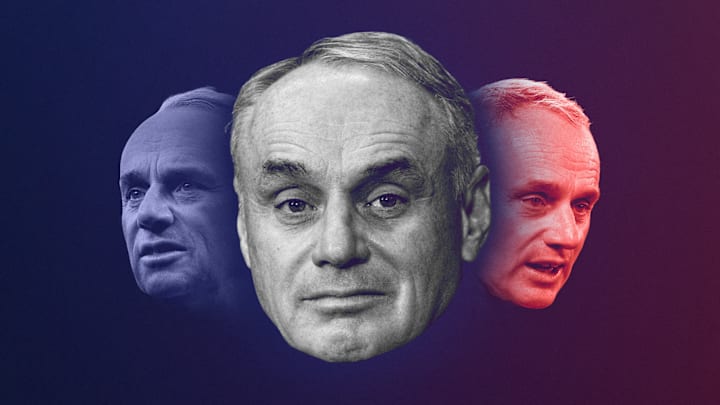It seems like only yesterday that more or less the entire sports world was utterly convinced that the Los Angeles Dodgers had broken baseball. The cries of "superteam" had already begun after last year's World Series title, and adding Japanese phenom Roki Sasaki as the cherry on top of an offseason that also included Blake Snell, Tanner Scott and other big names was enough to send the discourse into overdrive.
Just look at that roster! How could anyone hope to compete with a team for whom money was no object? The Dodgers were unbeatable, they said. We might as well just hand them the Commissioner's Trophy now and save everyone the trouble, they said. Only a salary cap could save MLB from competitive ruin, they said.
Flash forward six months or so, and the Dodgers are fighting desperately just to hang on to a one-game lead in the NL West. Dave Roberts' team is now just 2-5 in September, 22-25 in the second half, and each loss is seemingly more brutal than the last.
Emmanuel Rivera walks off the Dodgers with a two-run single in the 9th to give the Orioles a 4-3 win.
— Jacob Calvin Meyer (@jcalvinmeyer) September 7, 2025
The Orioles were being no-hit by Yoshinobu Yamamoto with 2 outs in the 9th. The next 6 batters reached base & brought home 4 runs.
The craziest baseball game you’ll ever seen. pic.twitter.com/peK05EHCcp
Sasaki struggled mightily in his MLB debut before going down with a shoulder injury, and while he's healthy again now, his stuff is so diminished that the team has kept him down at Triple-A. Scott has been among the worst free-agent deals of last winter, costing L.A. several games. And the marquee offensive addition, Michael Conforto, is so lost at the plate that fans have been calling for his benching for months now. Rather than a superteam, the Dodgers right now look an awful lot like ... a baseball team, one with plenty of talent but subject to the whims of the baseball gods and a 162-game season just like everyone else.
But if you think that's caused any of the powers that be around the sport to adjust their priors, well, think again. On the contrary: Rob Manfred is pushing even harder now for a salary cap than he was last offseason, and it seems all but certain that we're headed for a lockout when the current CBA expires at the end of 2026. Baseball's owners have lost their boogeyman, and yet the song remains the same — which should make clear just what this whole conversation has really been about this whole time.
For more news and rumors, check out MLB Insider Robert Murray’s work on The Baseball Insiders podcast, subscribe to The Moonshot, our weekly MLB newsletter, and join the discord to get the inside scoop during the MLB season.
Competitive balance was never really the issue for MLB's cheapest owners
And it's not just the Dodgers. The second-most expensive team in baseball this year, the New York Mets, are currently eight games back of the Philadelphia Phillies in the NL East and now have some work to do just to hold on to a Wild Card spot. The Yankees are looking up at the Blue Jays in the AL East, while the Brewers (24th in payroll) are lapping the Cubs (10th) in the NL Central.
None of which is to suggest that there's no correlation between money and winning; of course there is. It's just to say that the histrionics coming from Manfred and many of the sport's owners in recent months, claiming that there was simply nothing that anyone could do to compete if the Dodgers were allowed to spend like this, were just that: histrionic. If recent MLB history has shown us anything, it's that there are many, many ways to build a competitive baseball team, and that all sorts of things can happen over a long season.
What is required, however, is that you at least make an effort to compete. And that's where the real objection to what the Dodgers are doing has always lay: It's a problem not because it turns L.A. into an unstoppable force, but because it makes the cheapest teams in the league look bad. Unspoken in the salary cap discourse is that salary caps usually also come with salary floors, floors that teams like the Pirates and Rays have no interest in trying to hit.
MLB's ownership class has never really been concerned about competitive balance; at this point, they make their money regardless of whether their own teams win or lose. What they saw in the Dodgers' spending spree was an opportunity, a convenient stalking horse with which to scare players into submission and bring down their own bottom lines.
Now, though, what's the excuse? These Dodgers are in fact as mortal as anyone, vulnerable to the whims of injury or aging or underperformance, and a market like San Diego just went for broke at the trade deadline to try and unseat them from atop the NL West. If the Padres can do it, why can't Pittsburgh? Why can't Cleveland? The answer is simple: Because those owners don't want to, and because they'd rather line their own pockets.
I'm not naive enough to assume that the Dodgers falling short of a repeat this year will do all that much to change the contours of this debate. But it should be an object lesson to anyone thinking that baseball's economy is broken beyond repair: This game has a way of humbling everyone at some point, and if you want your team to have more of a shot, take it up with your own owner.
